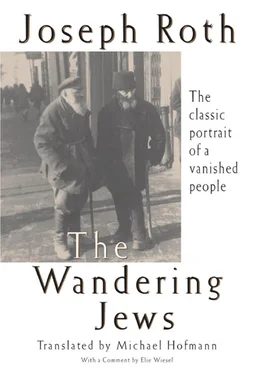Their grandfathers were still engaged in a desperate struggle with Jehovah, bruised their foreheads on the drab walls of the small prayerhouse, called out for their sins to be punished and begged for forgiveness. The grandsons have become Westerners. They need the organ to put them in the mood, their God is a redaction of nature, their prayer a formula. And on top of that they’re proud of it! They’re lieutenants in the reserve, and their God is a commanding officer, the same God by whose grace the kings sat on their thrones.
And the name for all this is Western civilization. Whoever has it is entitled to despise his cousin who, authentic and uncontaminated, comes from the East. Such an Eastern Jew has within himself more humanity and more divinity than all the preachers can come up with in all the theological colleges of Western Europe. With luck the cousin will have the fortitude not to lapse into assimilation.
In what follows, I will attempt to describe how the Eastern Jew and his kind live, first at home and then abroad.
* Dichter und Denker . The land of thinkers and poets is, of course, Germany. Sometimes this has been changed to Richter und Henker , judges and hangmen.
†Theodor Herzl (1860–1904), initially an assimilationist, later a Zionist.
‡Now Ternopil.

The little town lies in the middle of a great plain, not bounded by any hill or forest or river. It runs out into the plain. It begins with little huts and ends with them. After a while the huts are replaced by houses. Streets begin. One runs from north to south, the other from east to west. Where they intersect is the marketplace. At the far end of the north-south street is the railway station. A passenger train calls in once a day. A passenger train pulls out once a day. And yet, many people spend their entire day at the station. They are traders. Their interest legitimately extends to freight trains. In addition they take urgent letters to the station, because the town’s letterboxes are only emptied once a day. It is a fifteen-minute walk from the shtetl to the station. When it’s raining you have to take a cab, because the street is under water, it’s so poorly made. Poor people get together to share a cab, which can accommodate six people, though not exactly seat them. The rich man sits in the cab by himself and pays more for the ride than the six poor people. There are eight cabs available for hire. Six of them are one-horse carriages. The two twohorse carriages are for important visitors, who sometimes happen into town. The eight cabbies are Jews. They are devout Jews who don’t trim their beards but don’t wear the long robes of their fellow believers. They are better able to pursue their profession in short jerkins. They don’t drive on the Sabbath. On the Sabbath no one has any business at the station anyway. The town has eighteen thousand inhabitants, of whom fifteen thousand are Jews. Of the three thousand Christians, a hundred might be traders and merchants; another hundred, officials; one notary; one doctor; and eight policemen. There are actually ten policemen in all, but, bizarrely, two of them are Jews. What the other Christians do I’m not actually sure. Of the fifteen thousand Jews, eight thousand live from trade. They are small merchants, bigger merchants, and big merchants. The remaining seven thousand Jews are small artisans, laborers, water carriers, scholars, synagogue officials, and servants. They are teachers, scribes, Torah scribes, tallith weavers, doctors, lawyers, officials, beggars and paupers too ashamed to live on public welfare, as well as gravediggers, circumcisers, and gravestone cutters.
The town has two churches, a synagogue, and some forty little prayerhouses. The Jews go to pray three times a day. They would have to undertake the walk to the synagogue and back to their homes or shops six times a day, if they didn’t have so many prayerhouses, in which, incidentally, one doesn’t just pray, but also learns Jewish lore. There are Jewish scholars who, corresponding to European researchers in libraries, study in the prayerhouse from five in the morning until midnight. On the Sabbath and on holy days they go home to take their meals. Unless they happen to have patrons or private means, they live off small gifts from the community and off occasional devout works, for instance: acting as cantor, teaching, or blowing the shofar on High Holy Days. Their families, their homes, their children are all the responsibility of their wives, who carry on a small trade with maize in summer and naphtha in winter, as well as pickled cucumbers, beans, and baked goods.
The traders and other lay Jews say their prayers very quickly and leave themselves time to discuss current events and politics on the great and small stage. They smoke cigarettes and bad pipe tobacco in the prayerhouse. They treat it like an officers’ mess. They are not rare visitors of God, they live with him. They don’t make official state visits, they gather three times a day at his rich, poor, holy tables. In their prayers they inveigh against him, they cry to high heaven, they complain at his severity, they go to God to accuse God, and then go on to admit that they have sinned, that their punishments were just, and that they will be better in the future. There is no other people that lives on such a footing with their god. They are an old people and they have known him a long time! They have experienced his great goodness and his cold justice. They have sinned often and repented bitterly, and they know that while they may be punished they will never be abandoned.
To the outsider, all prayerhouses look the same. They aren’t, of course, and many of them use different forms of worship. While there are no sects as such in Judaism, there are various sectlike groupings. There is an implacably severe and a more moderate Orthodoxy. There are “Ashkenazi” and “Sephardic” prayers, and small textual variants in the same prayers.
Very clearly marked is the distinction between so-called enlightened Jews and the cabalists, the followers of various individual wonder-rabbis, each of whom has his own personal group of hasids. The enlightened Jews are not by any means unbelieving. They merely reject any form of mysticism, and their unshakable faith in the miracles related in Scripture remains completely unaffected by the unbelief with which they confront the miracles of contemporary rabbis. For the hasids, however, the wonderrabbi is the intercessor between man and God. The enlightened Jews have no need of any such intercessor. They prefer to do their own advocacy before him, regarding it as a sin to believe in any earthly power capable of anticipating God’s wisdom. And yet many Jews, even if they are not hasids, are unable to resist the wonderful atmosphere that wafts around a rabbi, and unbelieving Jews and even the occasional Christian peasant like to seek out a rabbi for help and solace when they are in difficulties.
To outsiders and enemies, Eastern Jews like to present a united front, or what appears to be a united front. Nothing gets through to the outside world of the zeal with which individual groups fight one another, the hatred and the bitterness with which the supporters of one wonderrabbi assail those of another, or the contempt all devout Jews have for those sons of their tribe who have conformed to the customs and dress of their Christian surroundings. Most devout Jews are unsparing in their condemnation of the man who shaves his beard — the clean-shaven face serving as the visible sign of breaking with the faith. The clean-shaven Jew no longer sports the badge of his people. He attempts, perhaps unconsciously, to ape those happy Christians who are not mocked or persecuted. Though even that isn’t enough for him to escape anti-Semitism. Anyway, it remains the obligation of the Jews to look to God, and not to their fellow man, for some relief of their position. Any form of assimilation, even the most superficial, constitutes flight or attempted flight from the sad society of the persecuted — an attempt to gloss over differences that aren’t so easily gotten rid of.
Читать дальше













